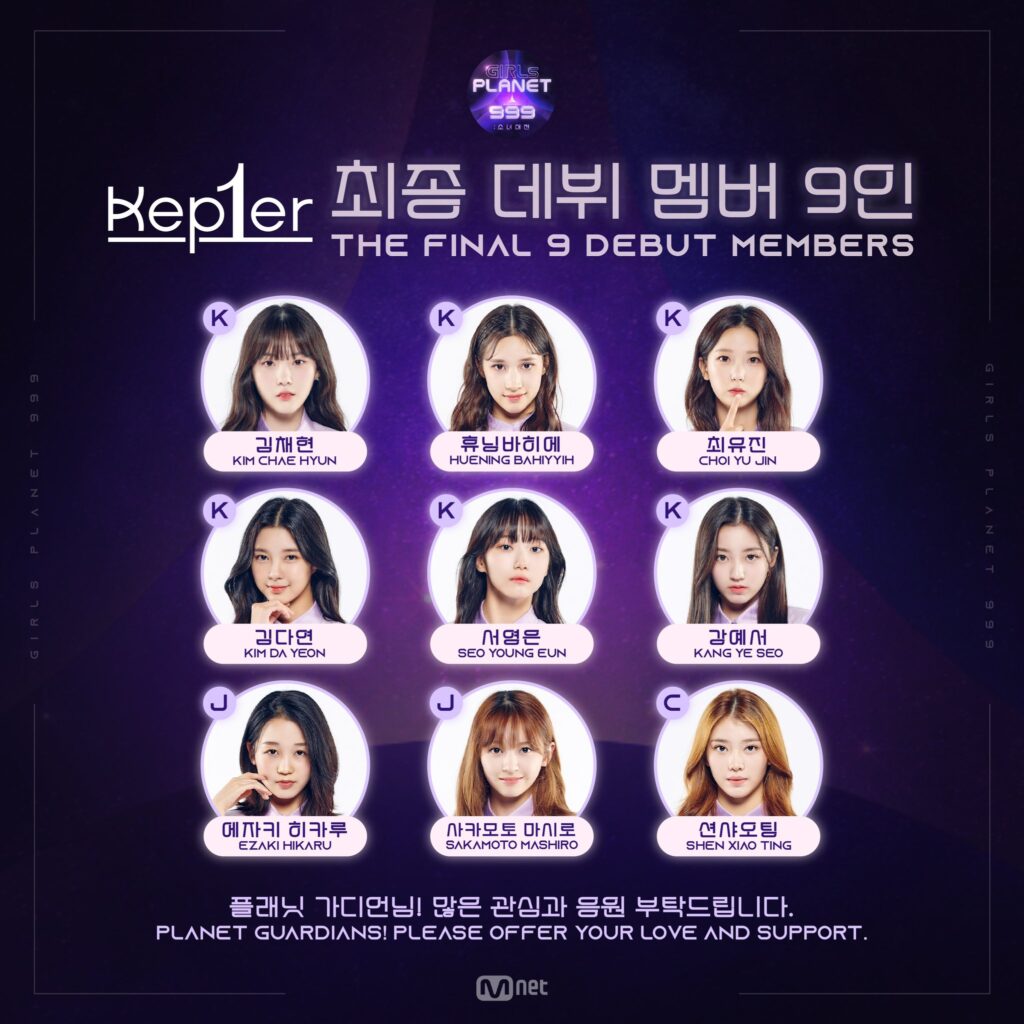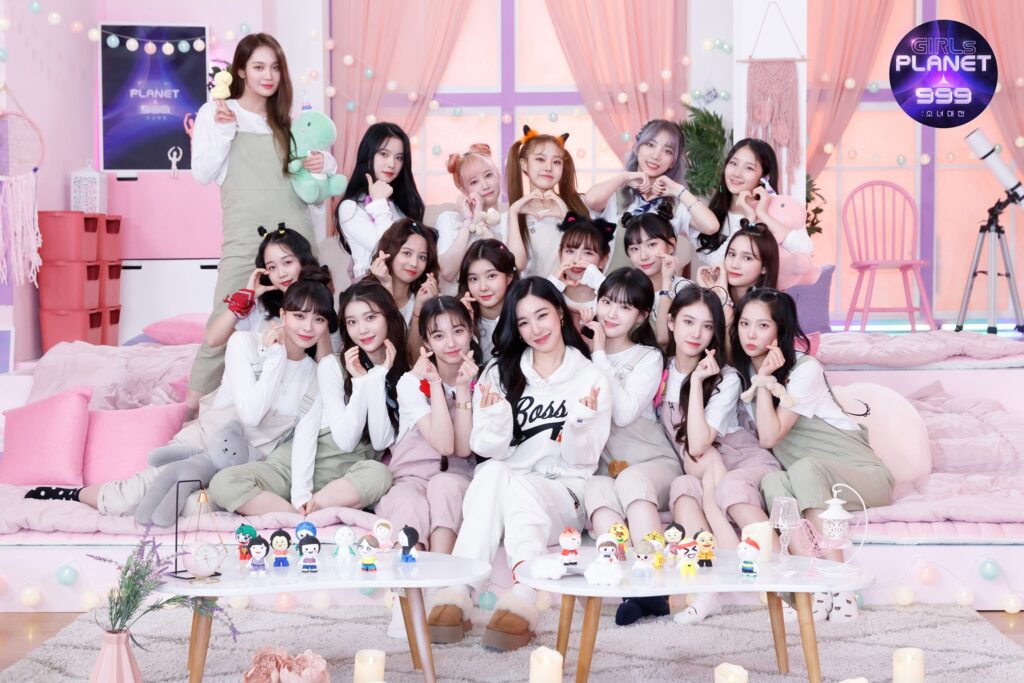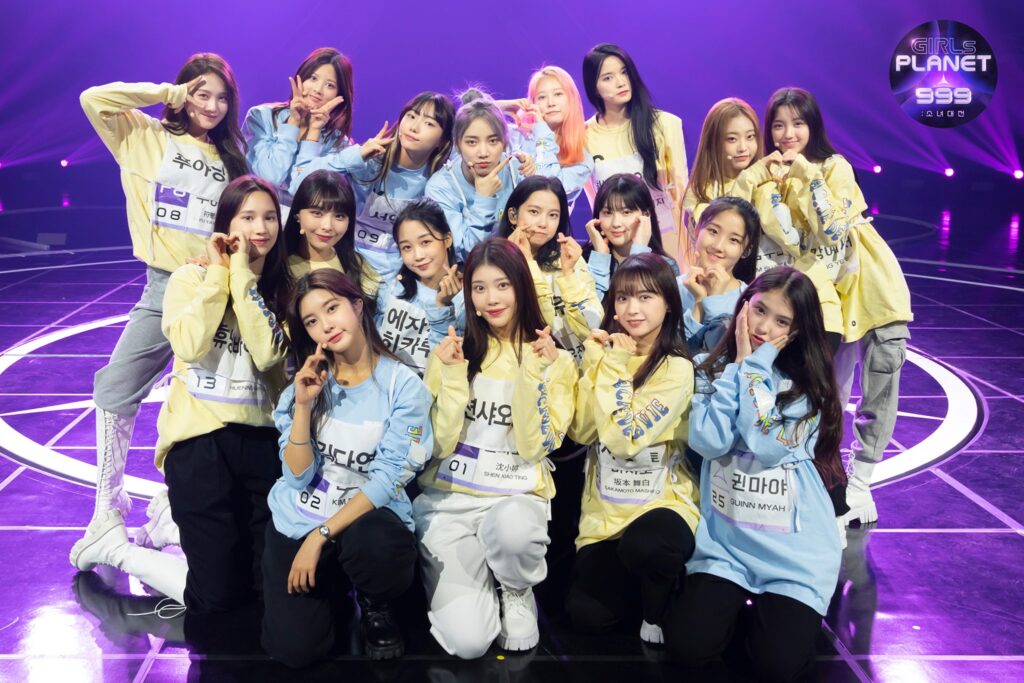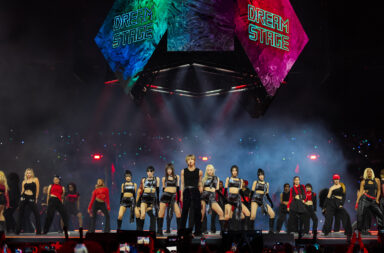
It’s no easy task to surpass yourself, but with Girls Planet 999, Mnet have managed to do it. The show, which ended last week, is a follow-up in everything but name to the controversial Produce series, an extremely successful idol survival competition show which allowed viewers to vote for trainees from a pool of around 100 to create a temporary group. Thanks to a disappointing and obvious underlying agenda revealed through repulsive editing, however, Girls Planet 999 manages to be not only the least enjoyable iteration of Mnet’s five seasons, but of all of the various versions produced by the very countries this spinoff seeks to bring together. As such, this is quite possibly the worst television that the broadcaster has put out – ever.
Things did not start out this way. The original Produce brand was a shining epitome of what idol competition shows could be at their best, with numerous lovable characters, inspiring stories, and excellent performances that remain legendary to this day. Between 2016 and 2019, the show gave birth to four successful groups: IOI, Wanna One, Iz One, and X1. Unfortunately, X1 had their career cut short when a scandal revealed that the show’s producers had manipulated the results of all four seasons, rejigging ranks to rig certain trainees in and others out, and effectively committing fraud due to the paid text voting mechanic. The ensuing public outrage left Mnet’s reputation in tatters and resulted in two producers going to prison.
Having allowed two years for the outrage to cool off, the network has boldly brought back the format this year, albeit with a rebranded identity, no-rigging guarantee, and a few surface-level changes to differentiate it from its predecessor. The most notable of these is a focus on international trainees, who previously formed either a tiny minority of the trainee pool, or in the case of Produce 48, 39 of the show’s 96, all from Japan’s 48 Group. Girls Planet 999 is ground-breaking in that it brings together a total of 99 trainees from across Korea, China, and Japan – 33 trainees from each country were chosen from the show’s 13,000 applicants and segregated accordingly into three groups: K Group, C Group, and J Group.
Initially, the show promised to bridge these neighbouring countries and cultures together, releasing three teaser performance videos of the show’s theme song, “O.O.O”, with a representative trainee selected as the centre of each group. The choice to allow three centres instead of one, and to spotlight each group with their own video, suggested a surprisingly strong commitment to and belief in their inherent equality.
This was not present in Produce 48, and strongly implied that the final nine-member group would include three girls from each country. Meanwhile, a mentor lineup featuring Yeo Jin-goo, Sunmi, and Tiffany, as well as upgraded branding, promotional campaigns, and stage design, all suggested significantly greater monetary investment than any edition of Produce. Girls Planet 999 thus promised to be refreshing and exciting, with an open-minded attitude towards the future of K-pop that surpassed any other large company and which was so apparently progressive it was quite disarming.
The only minor concern at this stage was the explicit segregation, which seemed to place an unnecessarily strong emphasis on nationality. Unfortunately, as the show began its run, this concern became justified. With a very few token exceptions, it quickly became clear that K Group trainees were consistently being portrayed positively, C Group trainees were consistently being portrayed negatively, and that J Group trainees were barely being portrayed at all.
Rather than as a basic starting point for intercultural exchange, Mnet was using the arbitrary trait of nationality as an indicator of human worth, purposely and repeatedly scoring deep lines into the ground between the trainees on that basis. Note that, as young women with similar careers, interests, ages, and East Asian cultures and appearances, these trainees most likely have much more in common with each other than not, and certainly more than they would the average viewer. Mnet largely chose to ignore this perspective, instead taking every opportunity over the course of 12 weeks to pit trainees from each group against each other. In doing so, they were effectively calling on viewers to choose a side – specifically, the Korean one.
They selectively exaggerated moments of conflict between trainees to imply a correlation between problematic personalities and nationality, but behind the extremely heavy-handed editing, these incidents most likely arose from, at worst, cultural differences or miscommunication, and, at best, individual misjudgments. Viewers varied in their ability to exercise critical thinking, however, and by the end of the show, deep fissures had been carved between each group. The rift between K Group and C Group in particular became so wide that the latter was effectively cast off to form their own island.
Mnet took no responsibility for the impact these portrayals had on the girls’ images and mental health. Their infamous “evil editing” techniques, often used to manufacture drama, have always been obvious and ridiculous to the point of being laughable, but the cruelty and malice with which it was applied here bordered on nauseating. It produced some of the biggest and most shocking hate campaigns of any Produce series ever – Fu Yaning started the series with over 30,000 dislikes on her fancam, while Cai Bing fell out of the top nine straight into last place following a devastatingly edited incident of poor leadership combined with language barriers.
The impact of these character assassinations became visually obvious over the series. Vivacious contestants, who started out with the confidence to put themselves forward for every opportunity, were by the end of it shells of their former selves, terrified to accept any important role for fear of being smited down with further edits. What made the Produce format so enjoyable originally was the fleshed-out, uplifting storylines of trainees overcoming various obstacles to improve their skills and confidence, eventually shining on stage as a result. These wholesome growth narratives created believable characters who were easy to root for, and their continuation across the series allowed viewers to become more and more emotionally attached.
Girls Planet 999 eschewed any convincingly organic positive storylines to instead spend its airtime constantly tearing down unwanted contestants. The result was what felt like tuning in to a weekly game of Russian roulette (comparisons to the concurrently trending Squid Game were depressingly accurate). The fact that Girls Planet 999 showed us the opposite of Produce meant that it failed to create the emotional investment and entertainment value needed for the show to gather momentum. Along with Mnet’s bruised reputation and a politically untimely focus on foreign trainees, this prevented Girls Planet 999’s domestic ratings from ever reaching even half that of previous seasons.
Facing a primarily international audience, Mnet decided to force increasingly negative and contrived C Group storylines down viewers’ throats until the end of its three-month run. These rarely allowed any kind of positive conclusion, even though Mnet could easily have chosen to actively help trainees work together as part of its overall narrative (as fellow international idol survival show Chuang 2021 did). What is ironic is that even viewers eventually realised that these edits were over the top; Mnet aired little to no redeeming footage except for their performances, but Fu Yaning still made a truly miraculous turnaround to finish in 12th place overall, while Cai Bing upon elimination opened an Instagram account which earned over 400,000 followers in a week.
To watch Girls Planet 999 was therefore to continually test your own patience and faith in humanity. It gleefully drew caricatures of its contestants that were intentionally crude and ugly, in ways which were deeply offensive not only to the portrait subject, but to the eyes of all but the most complicit of audiences. Mindful viewers can sense what the intention of a programme at its core is, after all, and the intention of Girls Planet 999 was without a doubt to sow discord and promote division. Where it could have been a salve to soothe the inflammation of political tensions between these countries at the moment, it instead chose to rub copious amounts of salt into the wound.
This is not to say that that same division was happening on the ground, however. Throughout the programme, we caught glimpses of the girls genuinely exchanging their cultures, learning each other’s languages, creating happy memories, and forming lasting friendships. But the programme itself made a mockery of this, permitting wholesome moments here and there at a surface level, but demonstrating blatant favouritism underneath.
The most notable example of this occurred when they took a group of girls to the house of one Korean contestant and had them perform for her mother, as part of a filler episode where each team tried different challenges (said contestant was in another team). They then filmed her bedroom and childhood photos, and had the trainees write personal letters to her. They give no explanation for such a biased segment, because there is no explanation that could possibly be considered acceptable by even the most naive of viewers.
Similarly, having purposely allowed trainees who aren’t fluent in Korean to join the show, the competition then required them to write and perform an original rap verse in Korean for the rap group of the “Combination Mission”. Such a rule is both unreasonable and unnecessary; it penalises trainees for a disadvantage that Mnet forced upon them. It would be one thing if the performance was just for fun, but each mission had a direct impact on the trainees’ survival, and thus their subsequent career prospects. It went directly against any true concept of sportsmanship or responsible mentorship, but then again, Mnet did not try to create even a facade of such things for Girls Planet 999.
Most disappointingly of all, there was almost no attempt to explore or explain the girls’ cultural differences – to see what embracing new ideas and people who are different to you can offer. Unlike Produce 48, there were no Chinese or Japanese songs performed, nor was there any mention of how the idol industries in each country differ. That would have helped to explain why the girls were here in the first place, what their specific strengths and weaknesses were, and how they prefer to communicate and bond with other trainees.
In particular, the show highlighted stark differences between each country’s expectations of how women should behave and the ideal image of female idols. These were not explored, but if they had been it would have made clear the Chinese trainees’ preference for unfiltered honesty and strong independence – something which likely earned them disapproval from Korean viewers, but which generated approval from international ones. It should also have been par for the course to see the girls teach each other about their local languages, pop cultures, traditions, and cuisines.
Instead, there was no room for cultural exchange, or for trainees to be their unique selves and to share their unique backgrounds. There were only two options – assimilation or elimination. Thus, what this programme revealed more than anything was just how hard it is for a foreigner to survive in this space. Viewers were already aware of how tough the K-pop system is for any trainee, but it is likely only now that they are able to empathise with trainees who are going through the same system with the additional challenges of miscommunication, assimilation, discrimination, and homesickness thrown in.
The show’s voting system also heavily favoured Korean voters by assigning equal value to the total number of Korean votes relative to the combined total number of votes from all other countries in the world – of which there were over 170. The show then forced voters to vote for trainees from each group, boosting the votes for foreign trainees, before removing this crucial handicap at the stage where they needed it most – the final voting period which would decide the debut lineup.
As such, it was only when an interim ranking was released a few days before the final that the true effect of Mnet’s K-Group-first strategy for Girls Planet 999 became clear. The lineup, consisting of the top nine trainees at that point in time, included eight out of nine remaining K Group trainees, one out of five C Group trainees, and zero out of four J Group trainees.

The surprise reveal spurred international fans to focus their remaining votes on foreign trainees, but even so the final group, named Kep1er, included (spoilers) only two J Group trainees at seventh and eighth place and one C Group trainee at ninth. In any case, the show’s entire concept had already been rendered meaningless the moment such a biased interim ranking was revealed – by the final episode, Girls Planet 999 was nothing but a farce.
Had the lineup excluded any foreign group completely, the resulting outrage from international fans would have caused ripples in the industry that could potentially have led to change, but as it was, Mnet managed to achieve a lineup just diverse enough that things will likely continue as they are for some time yet. As the show’s gamemaster, however, Mnet should not in the first place have enabled the kind of nationalist sentiments that produced the show’s final result by segregating trainees so obviously and giving disproportionate weight to the local market.
After all, at this point, the domestic Korean market is much less of a tastemaker than it used to be – the sales figures for Enhypen’s recent album are a testament to that – and the trajectory of groups like BTS suggests that Korean consumer tastes can in fact be changed following a group’s international success. This is not a bad thing; if anything, it’s proof of just how popular K-pop has become amongst global audiences, and how willing they are to spend money, time, energy, and emotion on its artists.
The industry deserves to celebrate such success, and every additional person that becomes a K-pop fan is a credit to the hard work that the staff and artists in this industry constantly put in. Thanks to both parties, K-pop is fast carving a place as an important part of global pop, a genre previously dominated by English-speaking artists due to historical Western hegemony. The industry deserves to reap all the rewards of such a major achievement, but it should also honor the responsibilities to their newfound audience that come with it.
That means acknowledging the extremely large portion of the pie that international consumers now contribute, whether that comes in the form of votes in a programme, users of a service, or sales of a product. As much as they decide to profit from that, it then also means respecting their rising ethical standards and making reasonable efforts to meet them. Currently, social movements among the global youth assign great importance to fairness and equality, diversity and inclusion, and kindness and compassion. Girls Planet 999 renounced all of these.

Now that K-pop is more global than ever before, it is only a matter of time before the industry will be expected to demonstrate their commitment to these values; it will not be able to rely only on fulfilling the bare minimum of domestic moral standards for much longer. Just as Mnet expected foreign trainees to conform to local norms when they entered their industry with the goal of personal benefit, so too does the international community expect K-pop to conform to global norms when it ascends the world stage with the goal of national benefit.
In the coming years, there will be increasing demand for K-pop’s representatives to echo the diversity seen amongst its growing global audience – we see the same happening across Western workplaces and mainstream media already. As such, the idols it chooses should be people who can represent and lead not just Korea, but the world’s combined youth, society, and culture towards a better future. If industry gatekeepers like Mnet forcefully squeeze talent that meets this criteria out of the country on the basis of nationality, then it will flow elsewhere, and fans with the freedom that globalisation and technology offers will begin to follow – especially if they become disillusioned with the status quo that is revealed through shows like Girls Planet 999.
Music markets from other emerging economies are already hot on the trail of K-pop, climbing fast towards the global stage now that the gate traditionally guarded by Western countries has finally been opened. If K-pop cannot keep up with and update itself according to the rising standards of its newfound audience, then it will soon find itself overwhelmed by competition.
That does not mean, however, that the global market is not big enough for everyone. With many countries’ pop cultures fast merging thanks to widespread access to technology (the fact that over 170 countries voted is proof of that), there is more than enough space for multiple individual markets within it to co-exist and prosper simultaneously. Thankfully, Mnet appears to be an exception among large Korean companies, and the rest of the K-pop industry has shown itself to be quite open-minded and positive about catering to a market that composes audiences from many countries, and not just a few. It therefore can and should be able to work alongside arts industries from around the world, allowing free-flowing exchange with goodwill as Girls Planet 999 once promised it would.

The positive effect that this kind of grassroots-level cultural exchange can have on top-level political relations should not be underestimated. The arts may always have reflected politics in some way or another, but the street runs in both directions, and when it comes to strengthening international relations, they truly play a very significant role.
As such, the arts, of which the entertainment business is a part, have both the ability and inescapable responsibility to help make the world a better place. Crucially, where politics has the tendency to divide people by treating them as groups, the arts have the power to unite people by treating them as the individual human beings that they are. Disregarding this invaluable ability (or worse, using it for the opposite purpose) is something to be deeply lamented.
Mnet may have helped to make K-pop what it is today, but it is in K-pop’s interests to dissociate itself from Mnet’s practices and attitudes, and the wider xenophobia it represents, as soon as possible. Girls Planet 999 has not only become a stain on the broadcaster’s already blackened reputation, but a question mark on K-pop’s supposed hospitality towards the many hopeful outsiders that are gathered at its border. The industry thus needs to turn and reflect on itself in order to eliminate the tumour that Mnet represents, before it grows into a cancer. K-pop has only just reached the global stage; if it doesn’t watch its step now, it could stumble.
(YouTube. Naver [1][2], Top Star News. Images via Mnet.)


